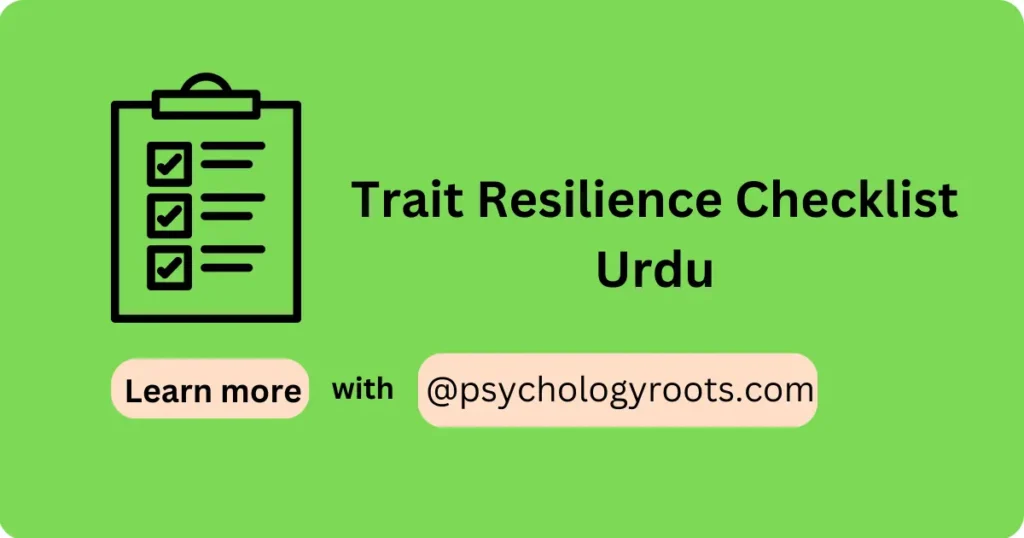Table of Contents
Trait Resilience Checklist Urdu
Here in this post, we are sharing the “Trait Resilience Checklist Urdu”. You can read psychometric and Author information. We have thousands of Scales and questionnaires in our collection (See Scales and Questionnaires). You can demand us any scale and questionnaires related to psychology through our community, and we will provide you with a short time. Keep visiting Psychology Roots.
About Scale Name
Scale Name
Trait Resilience Checklist Urdu
Author Details
Dr. Kian Hiew
Translation Availability
Not Sure

Background/Description
Trait Resilience Checklist (TRC). TRC is a 4 point scale consists of 18 items, developed by Hiew. Trait orientation (or trait resilience) suggests that resilience is a personal trait that helps individuals cope with adversity and achieve good adjustment and development. The Trait Resilience Checklist (TRC) is a self-report measure of seven resilience traits:
- Belief in one’s ability to cope. Do you believe that you can handle difficult situations?
- Connection with sources of support. Do you have people you can rely on for support when you need it?
- Communication about one’s experiences. Are you able to talk about your difficult experiences with others?
- Helping others. Do you find meaning in helping others?
- Activation of positive emotion. Do you focus on the positive aspects of your life, even during difficult times?
- Cultivating an attitude of survivorship. Do you believe that you can overcome difficult challenges?
- Seeking meaning. Do you find meaning in your life, even during difficult times?
The TRC was developed by Dr. Kian Hiew, a psychologist at the University of Malaya. The TRC was developed based on the concept of resilience, which is the ability to cope with adversity and bounce back from difficult experiences. The TRC is designed to assess the individual’s capacity for resilience, and to identify areas where resilience could be improved.
The TRC has been validated in a number of studies, and it has been shown to be a reliable and valid measure of resilience. The TRC has been used in research with people from a variety of cultures, and it has been shown to be a useful tool for assessing resilience in different populations.
The TRC is a useful tool for individuals who want to assess their own resilience, and to develop strategies for increasing resilience. The TRC can also be used by clinicians and researchers to assess resilience in individuals and groups.
Administration, Scoring and Interpretation
Here are the steps on how to administer the Trait Resilience Checklist:
- Provide the individual or group with a copy of the TRC.
- Read the instructions on the TRC to the individual or group.
- Allow the individual or group to complete the TRC independently.
- Collect the TRCs from the individual or group.
- Score the TRCs according to the instructions.
- Provide the individual or group with their scores.
Reliability and Validity
The Trait Resilience Checklist (TRC) has been shown to be a reliable and valid measure of resilience.
Reliability refers to the consistency of the TRC. In other words, if the TRC is administered to the same individual on two separate occasions, the individual’s scores should be similar. The TRC has been shown to have good test-retest reliability, with a correlation coefficient of 0.81. This means that the TRC is a consistent measure of resilience.
Validity refers to the extent to which the TRC measures what it is supposed to measure. In other words, the TRC should correlate with other measures of resilience. The TRC has been shown to have good concurrent validity, with correlations of 0.70 to 0.80 with other measures of resilience, such as the Connor-Davidson Resilience Scale (CD-RISC). This means that the TRC is a valid measure of resilience.
Available Versions
18-Items
Reference
yet not confirmed
Important Link
Scale File:
Frequently Asked Questions
What is the Trait Resilience Checklist?
It is a self-report measure of seven resilience traits.
Who developed the Trait Resilience Checklist?
Dr. Kian Hiew, a psychologist at the University of Malaya.
What are the seven resilience traits measured by the Trait Resilience Checklist?
Belief in one’s ability to cope, connection with sources of support, communication about one’s experiences, helping others, activation of positive emotion, cultivating an attitude of survivorship, and seeking meaning.
How is the Trait Resilience Checklist scored?
The Trait Resilience Checklist is scored by summing the number of items that you endorse. A higher score indicates higher levels of resilience.
Is the Trait Resilience Checklist reliable and valid?
Yes, the Trait Resilience Checklist has been shown to be reliable and valid in a number of studies.
Disclaimer
Please note that Psychology Roots does not have the right to grant permission for the use of any psychological scales or assessments listed on its website. To use any scale or assessment, you must obtain permission directly from the author or translator of the tool. Psychology Roots provides information about various tools and their administration procedures, but it is your responsibility to obtain proper permissions before using any scale or assessment. If you need further information about an author’s contact details, please submit a query to the Psychology Roots team.
Help Us Improve This Article
Have you discovered an inaccuracy? We put out great effort to give accurate and scientifically trustworthy information to our readers. Please notify us if you discover any typographical or grammatical errors.
Make a comment. We acknowledge and appreciate your efforts.
If you have any scale or any material related to psychology kindly share it with us at psychologyroots@gmail.com. We help others on behalf of you.